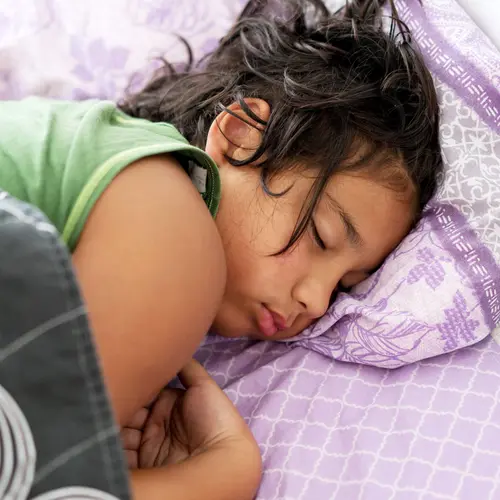You know your child needs sleep. But do you know why?
It's not just that overtired kids are cranky. Not getting enough sleep can hurt their health and ability to make good choices.
How much sleep should your kids get?
You may be surprised by how much they need.
- Toddlers: 12-14 hours
- Preschoolers: 11-13 hours
- School-age kids: 10-11 hours
- Tweens and teens: 8.5-9.25 hours
How Poor Sleep Affects Your Child
Your body uses sleep as a time to repair itself. Even half an hour less each night can derail that process. The effects of not getting enough sleep include:
Weight gain. Lack of sleep can make kids hungrier and drawn to high-calorie foods. When you’re tired, your body makes more of the hormone that makes you hungry, increasing your appetite. And when you're tired, it makes less of the hormone that tells you you’re full. So not only do you feel hungrier but you may eat more than usual before you realize that you’re full. Plus, lack of sleep also affects your metabolism. Not getting enough sleep raises the risk of diabetes and unhealthy weight gain in kids and adults.
Bad moods. "Kids who don't get enough sleep have trouble regulating their emotions," says Jodi A. Mindell, PhD, associate director of the Sleep Disorders Center at the Children's Hospital of Philadelphia and author of Sleeping Through the Night. Some of the surliness we associate with teenagers just being teens may actually be because they aren’t getting enough sleep, she says. Overtime, not getting enough sleep can increase risk of depression, anxiety, and substance abuse in teens.
Trouble in school. Sleep is essential for building memory. Without enough, your kids may not recall what they've learned, Mindell says.
Accidents. Tired kids are prone to accidents, including sports injuries. More than half of all teen drivers drove drowsy in the past year -- and drowsy-driving accidents are most common in people under age 25, Mindell says.
Bad judgment. "Kids who are overtired make worse decisions," Mindell says. That's not just a problem during SATs. They may be more likely to post an inappropriate picture on Facebook or get in a car with a kid who's been drinking.
How to Help Kids Get Enough Sleep
Take bedtime seriously. Set a firm bedtime and stick to it. Don't let your kids get jobs or take part in after-school activities that keep them out too late. Build your weekly schedules around having enough time for sleep.
Keep gadgets out of the bedroom. That means no TV -- and no laptops, phones, or tablets either.
"Have a rule that all gadgets stay plugged in on the kitchen counter at night," Mindell says. "That goes for the parents too, not just the kids."
Beyond the stimulation of getting texts all night, bright screens in a dark room can make it harder to sleep. Looking at them can trick the brain into thinking it’s still daytime -- that delays the release of chemicals that make you sleepy.
Encourage your teen to make sleep a priority. The average high school senior gets only 7 hours of sleep a night, a few hours less than they need.
As best you can, help your teen wind down at night. Letting them sleep in a little on the weekends is all right, Mindell says. But don't let them sleep past 9 or 9:30 a.m. "If they sleep until noon, they're going to start every week feeling jetlagged," she says.
Limit caffeine. Make sure your kids know to stay away from drinks with caffeine. Not only can caffeine wreck sleep and be bad for kids’ heart health, but caffeinated drinks like energy drinks, some sodas, and fancy coffees can have loads of sugar. Caffeine can lurk in unexpected places, too, like chocolate.
Exercise. If you want your kids to sleep better at night, get them moving. Kids who exercise fall asleep faster than inactive kids. They stay asleep longer, too. Aim to make sure they get 60 minutes of active play a day.


